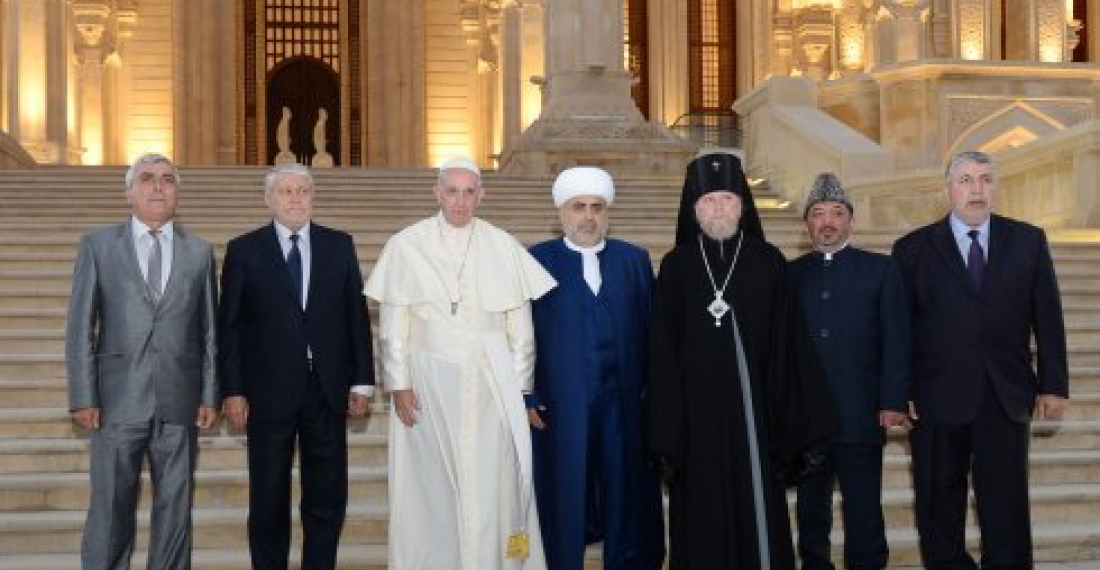Azerbaijan can be a loyal and effective partner in combating Islamic radicalisation because of its resilience and its experience of managing core problems related to the role of religion in society, argues Ramazan Samadov in this op-ed for commonspace.eu
For a Muslim-majority country in a neighbourhood that includes Russia, Iran and Turkey, effective foreign policy in Azerbaijan is necessary for basic survival as well as an essential tool for capitalising on regional opportunities. Located at the crossroads of the major trade and energy routes between East and West, North (Russia) and South (Iran), and maintaining the secularity of a state with a Muslim heritage, Azerbaijan is a natural bridge between Europe and Asia, the Muslim and Christian worlds, and a gateway to energy and international transportation corridors for its region. As the world attempts to tackle the global rise of radicalisation, Azerbaijan, as a Muslim-majority secular state, could be a valuable partner for Europe in looking at how to tackle radical Islam.
Despite more than 90% of the Azerbaijani population being Muslims, people prefer not to be labelled as such. Azerbaijan is a member of Organisation of Islamic Cooperation (OIC) as well as a member of the Council of Europe. The people of Azerbaijan have been Shamans, Christians, Sunnis, and Shias during different periods of their history, which has been a good tool to protect themselves from external threats. When Russia gets too close, they would say they are Muslims; when Turkey does so, they say they are Shia; and when Iran approaches them, they are Turks. Another fact which is interesting to mention is that, according to a recent Gallup Poll, Azerbaijan is one of the most irreligious countries in the Muslim world, with about 53% of respondents indicating the importance of religion in their life as being little or none. The same poll indicates that only 20% of respondents has attended religious services.
One of the spiritual fathers of Azerbaijan, Mirza Fatali Akhundov - the son of a mullah turned atheist playwright-philosopher - was one of the first notable people to start pushing forward secular ideas in Azerbaijan during the 19th century. To understand the scale of his role in our region, he is held in a similar regard as Montesquieu, Rousseau, and Voltaire in the West, and has even been referred to as the "Molière of the Orient". Akhundov sought to reform the country, and develop a secular culture. A few decades after his birth, Azerbaijan had its own theatres, opera houses, newspapers, and even a magazine, called Molla Nasraddin - perhaps the world's first Charlie Hebdo, which published jokes and satirical cartoons of Islam and mullahs. These were all historic firsts for the Muslim and Turkic world. This occurred over a hundred years ago, and yet, no one was attacked.
Secularity in Azerbaijan has continued along this trajectory. It is even reflected in the Azerbaijani language - "dunyəvi', the Azerbaijani word for secularity, literally translates as "this-Worldliness". In 1918, during the first Azerbaijani republic, there was a discussion about the country's national emblem - the flag. The Muslim faction of the Azerbaijani parliament wanted the colour green to appear at the top of the flag to represent the country's strong Islamic heritage. However, the majority-secular parliament decided against this, and while respecting that Islam is a part of Azerbaijan, argued that the green colour should be at the bottom of the flag. Above it, the blue represents the country's Turkic heritage, and the red, a symbol for the progress of Azerbaijani culture. This continues to serve as a good reflection of who Azerbaijanis are - the secular aspects of their national identity come before religion.
Azerbaijan was one of only two Muslim-majority countries to send troops to Iraq to support the US-led coalition during the Second Gulf War,, and also contributed to the international effort against the Taliban in Afghanistan. It has also participated in NATO's Partnership for Peace programme, and has had an Individual Partnership Agreement with that organisation since since 2005.
Azerbaijan is well-placed to play a bridging role between the EU and its eastern neighbourhood; not only in the military, economic and energy contexts, but in adding its valuable understanding of Islam to European efforts to counter and prevent violent extremism.
Despite having its own experience of extremist factions - notably, pockets of Salafist radicals in the north of the country - prevention measures and counter radicalisation policies have generally been effective alongside the promotion of secular government institutions; showing Azerbaijan to have a solid immune system when it comes to religious radicalisation. All of these factors strengthen the argument that Azerbaijan - and secular states like it - could be a loyal and effective partner in combating Islamic radicalisation because of its resilience, and its experience of managing core problems related to the role of religion in society.
Source: Ramazan Samadov is an Azerbaijani intellectual living in Europe.
Photo: Pope Francis during his visit to Baku in October 2016, seen here with local leaders of Muslim, Christian, Jewish and other faiths
The views expressed in opinion pieces and commentaries do not necessarily reflect the position of commonspace.eu or its partners







